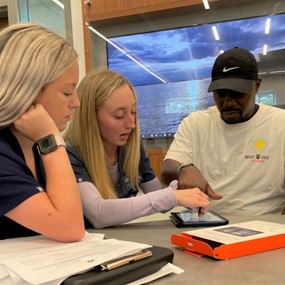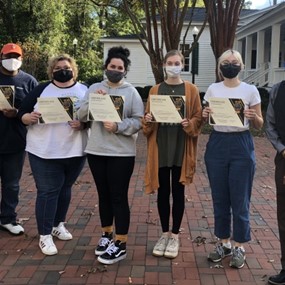Auburn professor gives advice for avoiding holiday blues, maintaining mental health

The holidays are a festive time where people come together to worship, give thanks and celebrate life, but they also can be a difficult time for many. Whether it’s remembering those who have been lost or the amplification of stressful interaction with family and friends, the holiday blues are an unfortunate reality for countless people.
Auburn’s Jordan Burko Macatee, an assistant clinical professor in the Department of Psychological Sciences, offers tips for anyone who may struggle with mental health during the holidays. She also provides plenty of resources and highlights ways those who may require assistance can get the help they need in this edition of Expert Answers.
Maintaining positive mental health is always important, but it is especially crucial during the holidays, when many people struggle with depression. What are some good ways for people to keep their spirits up and focusing on positivity during the holidays?
While the holidays can be a joyful time, they can also be a difficult time for many. Feelings of sadness, grief or loneliness can hit especially hard during this time of year. Simply trying to suppress those difficult emotions is not effective, and it is important to acknowledge and validate the presence of them. It is healthy and normal to feel a range of emotions, and it can be helpful to find ways to express them, such as through journaling or talking to a trusted person. Acknowledging these difficult feelings and engaging in healthy coping strategies can help improve mood.
Depression is often associated with negative thinking patterns. One way to gently shift this way of thinking is to engage in regular gratitude practice, which has been shown to improve mood over time. Gratitude involves intentionally reflecting on positive aspects of one’s life and can be a powerful tool in reframing how we think about things. Try writing down 1-3 things you feel grateful for each day.
Research also shows that maintaining a consistent routine, and engaging in enjoyable activities, is important for positive mood. While one of the well-deserved perks of the holiday season is time off work or school, the shift from a regular daily routine to no routine can be difficult. Maintaining a flexible routine, including wake and bed time, exercise and down time, can be helpful. To give yourself something to look forward to, try to intentionally schedule at least one enjoyable activity a day.
Finally, while it can be wonderful to see what our friends and family are up to this time of year on social media, often it can lead us to feel left out or compare ourselves to others in an unhelpful way. Remind yourself that what is shown on social media are most often the positive highlights and recognize that there is likely much you aren’t seeing. If you notice that scrolling through your social media feed is not serving your mood in a positive way, practice setting boundaries around how much you are using these platforms.
The holidays are an isolating time for some people. What are some good ways they can become involved with others to avoid isolation and feelings of melancholy?
Maintaining social connections can be a powerful way to improve mood. Volunteering with local organizations is one way to blend kindness with staying connected. Organizations that provide or deliver meals, youth services, hospitals, nursing homes and many others may be looking for volunteers. Animal shelters may also need helpers to play with, exercise or bathe animals. Spending time with these furry friends can also boost mood.
For those who identify as religious or spiritual, enjoying religious events or gatherings during this time can promote feelings of connection with others with similar values. Supporting others who may also feel isolated during this time of year can help. Consider writing cards to service members or those who are incarcerated or donating to a gift drive to support the families of these individuals. If you are not able to physically be with loved ones during the holiday season, consider ways to connect with them virtually. Engaging in a special tradition “together,” though physically apart, can also be a way to encourage feelings of closeness.
In general terms, how important is maintaining positive mental health for a person’s well-being and overall health?
Very! Maintaining our psychological health is an essential component to overall well-being and health. Like regular exercise and adequate nutrition to maintain our physical health, it is also important to practice consistent strategies to maintain our mental health. Positive mental health is strongly associated with better physical health outcomes, including but not limited to immune system functioning, cardiovascular health and blood pressure. There is a reciprocal relationship between physical and mental health, and both contribute significantly to overall well-being and life satisfaction. It is important that we prioritize both in efforts toward establishing healthy lifestyles.
What are some resources, both for students and the public, people can utilize during times of crisis or uncertainty?
First, if you or someone you know is experiencing a suicidal crisis, you can contact the National Suicide Prevention Lifeline (1-800-273-8255). You can also text “HOME” to 741741 to speak to a crisis counselor through the Crisis Text Line. The Student Counseling and Psychological Services Center (SCPS, 334-844-5123) is a wonderful free on-campus resource which offers individual and group therapy, workshops and a variety of coping resources to Auburn University students. The Auburn University Psychological Services Center (AUPSC, 334-844-4889), located in Cary Hall, provides services therapy and assessment services to the campus and local community. The Marriage and Family Therapy Center (334-844-4478) located on-campus in the Glanton House provides services for individuals, couples and families and is available to the campus and local community. The Employee Assistance Program (EAP, 1-800-925-5EAP) offers confidential and free mental health services to all benefit-eligible employees and their eligible dependents.
Tags: Faculty Community, Outreach and Engagement Psychological Sciences






